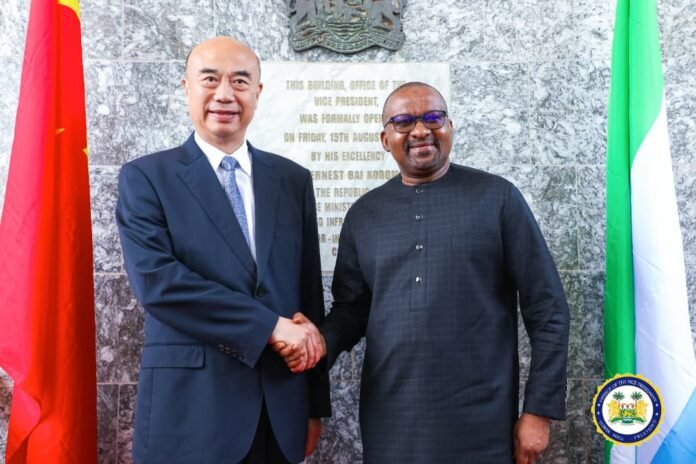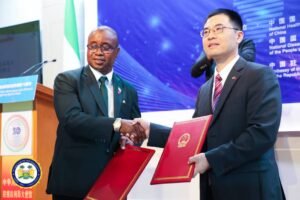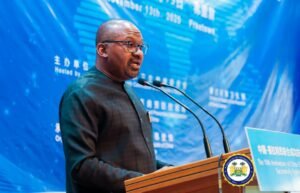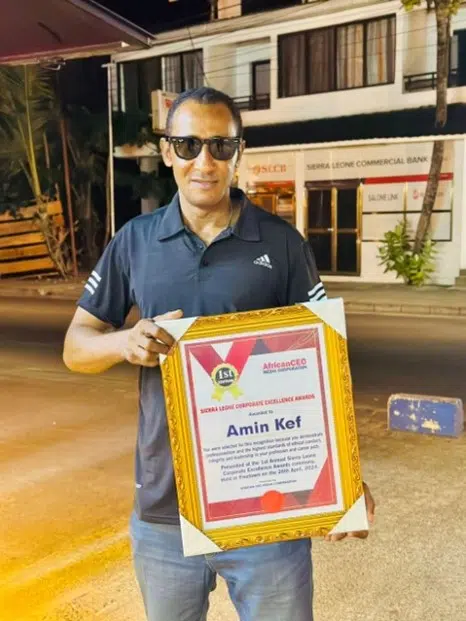
By Amin Kef (Ranger)
Sierra Leone and China have renewed their commitment to strengthening public health cooperation, a decade after their united fight against the devastating Ebola epidemic. The renewed pledge formed part of a major bilateral engagement between the two nations, as China’s Vice Premier, H.E. Liu Guozhong, arrived in Freetown for a high-profile working visit covering health cooperation, trade and infrastructure development.
Vice Premier Liu Guozhong was received at Tower Hill by Sierra Leone’s Vice President, Dr. Mohamed Juldeh Jalloh, where the two leaders held a bilateral meeting focused on deepening cooperation across education, health, infrastructure and cultural exchange. Vice President Dr. Mohamed Juldeh Jalloh underscored China’s longstanding support since diplomatic relations were established in 1971, noting that China remains Sierra Leone’s largest trading partner. “Our partnership with China has been built on sustained development cooperation, mutual trust and shared aspirations,” he said.
Their meeting set the stage for two major events on the Vice Premier’s itinerary: the commemoration of ten years since the defeat of Ebola a crisis in which China played a pivotal role and the unveiling of the USD 55 million Fish Harbour Project at Black Johnson funded through a grant from the Chinese Government.
The Vice President described the commemoration ceremony at the Foreign Service Academy as a moment of remembrance and renewed resolve. “This is not just a reflection on our past struggles but a celebration of resilience and partnership that continues to save lives,” he said. He recalled the trauma of the 2014 Ebola outbreak, one of the darkest periods in Sierra Leone’s history and emphasized that it underscored the need for a strong, permanent health-security system. “Preparedness is not an event, it is a system,” Dr. Mohamed Juldeh Jalloh noted, adding that Sierra Leone can now diagnose more than ten epidemic-prone diseases, a capacity that simply did not exist before the epidemic.
He credited China’s swift and decisive intervention during the crisis, saying its support came at a time “when Sierra Leone was at its most vulnerable.” What began as emergency assistance, he explained, has since evolved into sustainable systems strengthening. Facilities such as the China-Sierra Leone Friendship Hospital at Jui, the Infectious Disease Prevention and Control Center and expanded laboratory and surveillance infrastructure now form key pillars of Sierra Leone’s national health preparedness network. “Our cooperation with China has evolved from crisis response to building long-term resilience,” the Vice President affirmed.
Vice Premier Liu Guozhong echoed those sentiments, noting that the success of the Ebola response “opened a new chapter in China–Sierra Leone health relations.” He highlighted more than fifty years of continuous medical cooperation between the two countries, during which Chinese medical teams have worked side by side with Sierra Leonean professionals to strengthen healthcare delivery. “We have stood with Sierra Leone through epidemics and emergencies and we remain committed to safeguarding the health of your people,” he said.
He announced several new initiatives under the China–Africa Health Partnership, including the establishment of a Chinese Medicine Center in Sierra Leone, the construction of a biosafety laboratory to expand scientific research capacities and the deployment of telemedicine and artificial-intelligence tools to enhance healthcare service delivery. “Standing on a new historical starting point, China is ready to deepen public-health cooperation and contribute to a shared future for health,” he remarked.
Acting Minister of Health, Dr. Charles Senessie, welcomed the renewed commitments, describing them as “a partnership built on mutual trust, respect and shared purpose.” He hailed China’s rapid deployment of medical experts during the Ebola outbreak and its continued investment in Sierra Leone’s health infrastructure, calling facilities such as the Jui Biosafety Laboratory and the Tropical Disease Prevention Center “monuments to our friendship and determination.”
Dr. Charles Senessie praised Chinese medical teams for training Sierra Leonean health professionals and strengthening disease surveillance and laboratory systems. He stressed that those contributions have significantly improved the country’s ability to detect, prevent and respond to emerging health threats. “Together, we are building a legacy of health, resilience and shared prosperity that will endure for generations,” he said.
The Vice Premier’s visit, one of the most significant high-level Chinese engagements in recent years, reflects the growing importance China places on its partnership with Sierra Leone. Cooperation in health, trade, infrastructure and investment has expanded substantially under the Bio administration, with new projects such as the Fish Harbour at Black Johnson expected to deliver long-term economic and social benefits.
As the commemoration concluded, both nations reaffirmed their commitment to strengthening health security and expanding development cooperation. The deepening partnership, rooted in history, strengthened through crisis and anchored in shared aspirations, signals a new chapter in Sierra Leone–China relations focused on building a healthier, more resilient and more prosperous future.








